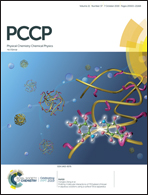Revisiting π backbonding: the influence of d orbitals on metal–CO bonds and ligand red shifts†
Abstract
The concept of π backbonding is widely used to explain the complex stabilities and CO stretch frequency red shifts of transition metal carbonyls. We theoretically investigate a non-transition metal 18-electron carbonyl complex (Mg(CO)8) and find a pronounced CO red shift without metal–carbon π bonds. Moreover, we use truncated basis sets on the “honorary” and true transition metals Ca and Ti in Ca(CO)8 and [Ti(CO)8]2+ complexes to probe the influence of d functions on carbonyl complex stability, C–O bond strength, metal-to-ligand charge transfer and bond order compared to hypothetical complexes without metal-d contributions. We find that the occurrence of metal–ligand π bonds through metal d functions greatly enhances the complex stabilities on one hand but only slightly affects the CO red shift on the other hand, compared to metal carbonyl systems with no d contributions. We also highlight the discrepancy between the formal oxidation state of 0 of Mg and Ca despite them carrying a significant positive charge.



 Please wait while we load your content...
Please wait while we load your content...